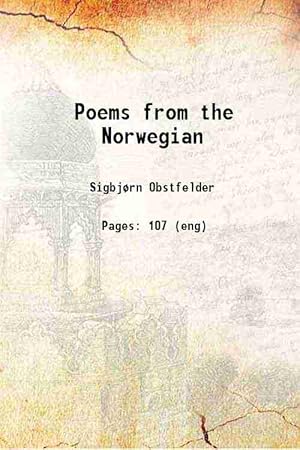
Sigbjørn Obstfelder, Priest's Diary, Trans. by James McFarlane, Norvik Press, 1987.
The spirit of the 1890s found its most uniquely characteristic expression in the work of this poet. Generally accepted as having been the young 'Scandinavian in Paris' whom Rilke used as a model for the eponymous hero of Malte Laurids Brigge, Obstfelder was singularly attuned to the period in which he lived. This, his last and in its conception most ambitious work was cruelly cut short by his tragic death in 1900 at the age of thirty-three, and in its incomplete form was published posthumously. It is the diary of a priest, a man sustained by the conviction that within the chaotic immediacy of life, there lies a coherent ordering principle waiting to be discovered.
It's a little odd and perhaps unfair to "rate" an unfinished work published posthumously in draft form--in translation, no less. Two stars for the book as it is (and forever will be), a third star as a way of giving Obstfelder the benefit of the doubt that, had he but world enough and time... The entries often read like phenomenological accounts of manic episodes interlarded with quaint or dated theological musings. Despite its extreme brevity, I found it repetitive and surprisingly difficult to read more than a few pages at a time. Compelling at points that were, unfortunately, few and far between.- Todd https://www.goodreads.com/book/show/3576665-priest-s-diary

Sigbjørn Obstfelder, Poems from the Norwegian, Blackwell, 1920.
read it here
Primarily known as a writer of poetry, Obstfelder's debut collection of poems from 1893, Digte (Poems), is usually credited as one of the earliest examples of modernism in Norwegian literature. Despite producing only a mere handful of works during his short lifespan, he is considered one of the most important figures in Norwegian literature of the late 19th century. Strongly influenced by the French poet Charles Baudelaire, his writings have often been described as the literary equivalent of Edvard Munch's paintings; indeed, the two were friends. Obstfelder was a source of inspiration for Rainer Maria Rilke's work The Notebooks of Malte Laurids Brigge. Obstfelder lived most of his life as a pauper, and never stayed in one place for very long. By all accounts he had an unstable mental health, and suffered several nervous breakdowns. He died from tuberculosis in Copenhagen in 1900.

No comments:
Post a Comment
Note: Only a member of this blog may post a comment.